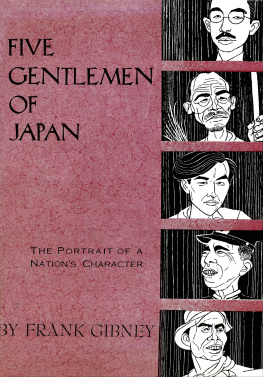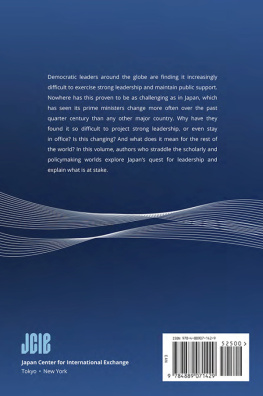ROUTLEDGE LIBRARY EDITIONS: JAPAN
MILITARISM AND FOREIGN POLICY IN JAPAN
MILITARISM AND FOREIGN POLICY IN JAPAN
E.E.N.CAUSTON
Volume 28

LONDON AND NEW YORK
First published in 1936
This edition first published in 2011
by Routledge
2 Park Square, Milton Park, Abingdon, Oxon, OX14 4RN
Simultaneously published in the USA and Canada
by Routledge
270 Madison Avenue, New York, NY 10016
Routledge is an imprint of the Taylor & Francis Group, an informa business
This edition published in the Taylor & Francis e-Library, 2010.
To purchase your own copy of this or any of Taylor & Francis or Routledges collection of thousands of eBooks please go to www.eBookstore.tandf.co.uk.
1936 George Allen & Unwin Ltd.
All rights reserved. No part of this book may be reprinted or reproduced or
utilised in any form or by any electronic, mechanical, or other means, now
known or hereafter invented, including photocopying and recording, or in any
information storage or retrieval system, without permission in writing from the
publishers.
British Library Cataloguing in Publication Data
A catalogue record for this book is available from the British Library
ISBN 0-203-84553-6 Master e-book ISBN
ISBN 13: 978-0-415-56498-4 (Set)
eISBN 13: 978-0-203-84317-8 (Set)
ISBN 13: 978-0-415-58532-3 (Volume 28)
eISBN 13: 978-0-203-84553-0 (Volume 28)
Publishers Note
The publisher has gone to great lengths to ensure the quality of this reprint but
points out that some imperfections in the original copies may be apparent.
Disclaimer
The publisher has made every effort to trace copyright holders and would
welcome correspondence from those they have been unable to trace.
MILITARISM AND FOREIGN POLICY IN JAPAN
BY
E.E.N.CAUSTON
B.A.(CANTAB.), M.A.(YALE)
LONDON
GEORGE ALLEN & UNWIN LTD
MUSEUM STREET
FIRST PUBLISHED IN 1936
This edition published in the Taylor & Francis e-Library, 2010.
To purchase your own copy of this or any of Taylor & Francis or Routledges collection of thousands of eBooks please go to www.eBookstore.tandf.co.uk.
All rights reserved
AUTHORS PREFACE
THIS volume was written in the form of an essay as one of the requirements for the degree of Master of Arts at Yale University, U.S.A. From its very nature, therefore, it can be no more than a mere outline of the subject with which it sets out to deal.
Both in the United States and in Europe an ever-increasing interest is being shown in the apparent influence which the Army and Navy exert upon the government and foreign policy of Japan. This influence has been stressed in every treatise on the government of Japan. Yet its importance as a factor in the formulation of her policy would seem to justify an attempt to analyse its causes and effects, and to explain an attitude so often misinterpreted by the rest of the world.
Undoubtedly many diverse factors influence the trend of a nations foreign policy. This volume may, however, elucidate that particular factor which is apparently so pronounced in Japan, and may be a small contribution towards the better understanding of a country which, in little more than half a century, has risen from a state of isolation to a position of political and industrial eminence.
LONDON
May 1936
INTRODUCTION
IT is a bold task to undertake the discussion of the problems of any country without an intimate knowledge of its language, its people and its customs. It is perhaps too bold a task to enter upon a study of Japan, since the East is a comparatively unknown quantity to the Occidental whose judgment may be warped by an inclination to apply the standards of the West to the problems of the East. Any conclusions which may be reached by an Occidental must, therefore, be regarded with apprehension; it would seem more politic that they should be regarded in the light of suggestions which may be food for thought.
In the last four years there have been constant reminders that the conduct of government in Japan has not been carried on according to Western democratic ideas. Reports from Japan have suggested that the Army and the Navy exert an influence far stronger than the services of any nation in post-war Europe could possess under the various forms of Western government. It is the task of this essay to set forth the occasions upon which that influence has been apparent and to suggest reasons for its existence. With this object it has been necessary to discover the particular elements which have made Japan a happy hunting-ground for undemocratic and chauvinistic influences and have so shaped Japanese ideology that such influences have been acceptable, or have, at least, met with scant opposition. This search has led to a study of the legacies of Japanese history, of national beliefs, and of the effects of foreign influences. Yet a discussion of these elements, though it provides data for a background against which there might well be a chauvinistic appeal, fails to lead to any definite conclusion. The quest for reasons for such an appeal and for the particular influence which the Army and the Navy are able to exert at the present time involves more practical considerations. It is necessary to discern why democratic institutions have not attained the important place they have occupied in Western countries, and why no measure of democratic control has ever been established over the direction of national policy. For just as research into the ideology of the Japanese people may reveal the background for a chauvinistic appeal, so may research into the political organization of the country suggest reasons why the Army and Navy have attained their present influential position. It is the object of this essay, therefore, to endeavour first of all to set forth the reasons why the Army and the Navy have attained to a position from which they may, if they so wish, exert a very great influence upon the direction of national policy, and, secondly, to ascertain whether they have made use of their position.
With this object in view it has seemed pertinent to discuss in the first chapter (of this essay) those parts of Japanese ideology which may form the background for the appeal of a group which desires to lead the nation along a chauvinistic path.
1 The reference to democratic institutions is to those which existed before the introduction of Dictatorships in European countries in the post-War period.
Space forbids a complete analysis of Japanese ideology, but this chapter will attempt to point out those elements, such as the contributions of feudalism, Bushido and Shinto, and the influence of Western nations, which appear significant in the formation of that background. In the second chapter it is hoped that it will be made clear how the task of any group which desires to influence national policy has been simplified by the failure of democratic institutions to gain control of the machinery of State, partly as a result of the undemocratic nature of the Constitution, partly as a result of the behaviour of the political parties. In the first two chapters there is an Intention, therefore, to show that if there is a chauvinistic group which desires to launch the country upon the course it advocates there is a background to which it may appeal, and a political organization which makes effective opposition to its ideas improbable.








